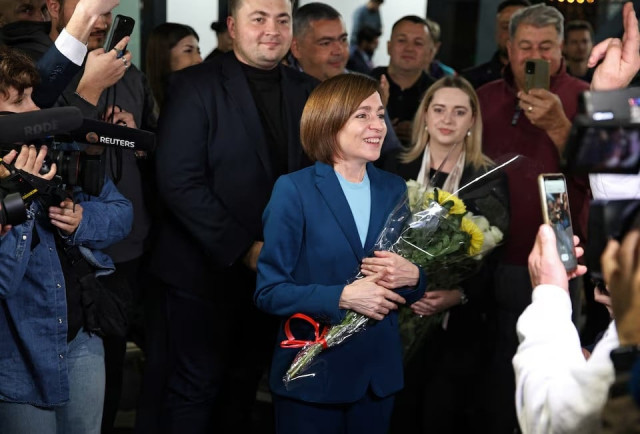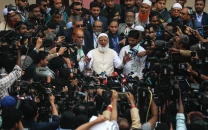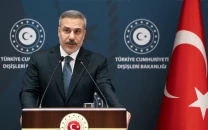Sandu defeats pro-Russian rival in Moldova
With 98% of ballots counted, Sandu led with 54.35%, concluding a campaign marked by allegations of interference

Moldova's pro-Western incumbent, Maia Sandu, declared victory in Sunday’s tightly contested presidential election, surpassing her rival Alexandr Stoianoglo, who was supported by the pro-Russian Socialist Party.
According to the Central Election Commission, with 98% of votes counted, Sandu held a lead of 54.35% over Stoianoglo, concluding a campaign marked by allegations of foreign interference, which Russia has denied.
Sandu, a 52-year-old former World Bank adviser, has spearheaded Moldova’s shift away from Moscow and towards the European Union, a stance her supporters see affirmed by this victory. However, Stoianoglo's popularity in several regions indicates her party will face considerable opposition in next summer's parliamentary elections, which will shape the government.
While Stoianoglo advocated EU integration, he also promoted closer ties with Russia, positioning himself as a neutral candidate serving national interests. Sandu, however, described him as a Kremlin-backed agent, a claim he rejected.
Moldova’s direction, a historically agricultural nation alternating between pro-Russian and pro-Western leanings since the Soviet Union’s collapse in 1991, has drawn global attention, especially since Russia's 2022 invasion of neighbouring Ukraine. European interest in Moldova’s path grew following Georgia’s recent re-election of a pro-Russian-leaning government.
In her conciliatory victory address, Sandu celebrated Moldova’s choice, saying, “Moldova, you have triumphed! ... In our pursuit of a dignified future, no one has lost.” She pledged to serve all citizens, addressing both her supporters and Stoianoglo’s voters.
This election saw the largest turnout of Moldovan expatriates since 2010, when overseas voting was first permitted. Domestically, Stoianoglo narrowly edged out Sandu with 51.2% to her 48.8%, while Sandu was set to secure over 80% of the diaspora vote, which significantly shifted the overall balance, noted Ukrainian analyst Ruslan Rokhov.
On Sunday, Sandu's national security adviser, Stanislav Secrieru, accused Russia of substantial electoral interference, echoing past allegations also directed at oligarch Ilan Shor, who lives in Russia and denies wrongdoing. Secrieru referenced tactics including vote mobilisation, cyberattacks, and bomb threats at polling stations abroad. Law enforcement responded by cracking down on what they termed a vast vote-buying scheme allegedly organised by Shor during the first round, alongside a referendum on EU membership that passed with a slim 50.35% pro-EU majority.
In contrast to Sandu’s firm distancing from Russia during her four-year term, Stoianoglo promoted a balanced foreign policy. Sandu’s tenure has included expelling Russian diplomats and condemning Russia's Ukraine invasion, leading Moscow to label her government “Russophobic.” She framed the election as a choice between EU membership by 2030 and continued instability, while Stoianoglo criticised her for failing to support everyday Moldovans and fostering division in a country with a Romanian-speaking majority and a significant Russian-speaking minority.
Stoianoglo capitalised on dissent regarding Sandu's economic policies, with Moldova facing economic strain from COVID-19’s aftermath and the Ukraine conflict, which led to a surge in refugees and cuts in Russian gas supplies, fuelling inflation. Addressing these concerns, Sandu reassured citizens, saying, “I have heard all voices, including the critical ones. Thank you for rising above grievances to safeguard our nation.”



















COMMENTS
Comments are moderated and generally will be posted if they are on-topic and not abusive.
For more information, please see our Comments FAQ